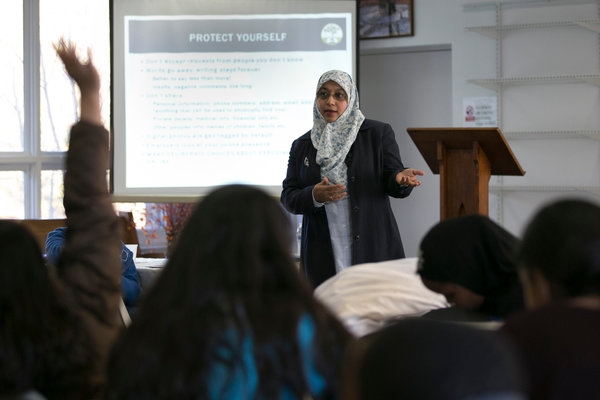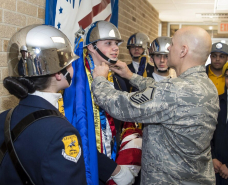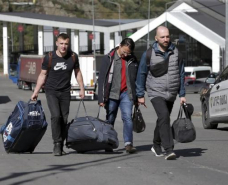U.S. Muslims Take On ISIS’ Recruiting Machine

By Laurie Goodstein
STERLING, Va. — Imam Mohamed Magid tries to stay in regular contact with the teenager who came to him a few months ago, at his family’s urging, to discuss how he was being wooed by online recruiters working for the Islamic State, the extremist group in Syria and Iraq.
But the imam, a scholar bursting with charm and authority, has struggled to compete. Though he has successfully intervened in the cases of five other young men, persuading them to abandon plans to fight overseas, the Islamic State’s recruiting efforts have become even more disturbing, he said, and nonstop.
“The recruiters wouldn’t leave him alone,” Imam Magid said of the young man he met with recently. “They were on social media with him at all hours, they tweet him at night, first thing in the morning. If I talk to him for an hour, they undo him in two hours.”
President Obama on Wednesday described the fight against violent extremism as a “generational challenge” that would require the cooperation of governments, religious leaders, educators and law enforcement. But even before he called on more than 60 nations to join the effort, the rise of the Islamic State and the attacks by homegrown terrorists in Paris, Ottawa, Copenhagen and Sydney, Australia, had jolted American Muslims into action.
Muslim leaders here and elsewhere have already started organizing or expanding prevention programs and discussions on countering violent extremism, often with assistance from law enforcement officials and trained counter-recruiters who emphasize that the Internet’s dangers for young Muslims now go far beyond pornography.
With the Islamic State in particular deploying savvy online appeals to adolescents alongside videos of horrific executions, the sense of urgency has grown. Though some Muslim leaders still resist cooperating with the government, fearing that they would be contributing to religious profiling and anti-Muslim bigotry, many have been spurred to respond as they have come into contact with religiously ardent youths who feel alienated by life in the West and admit that they have been vulnerable to the Islamic State’s invitation to help build a puritanical utopia.
“The number is small, but one person who gets radicalized is one too many,” said Rizwan Jaka, a father of six and the board chairman of the All Dulles Area Muslim Society, where Imam Magid is the spiritual leader. “It’s a balancing act: We have to make sure our youth are not stereotyped in any way, but we’re still dealing with the real issue of insulating them from any potential threat of radicalization.”
In practice, it often means one-on-one conversations with Muslims like Amir, a 22-year-old computer programmer in Virginia who said he was drawn to extremist videos from the Islamic State, also known as ISIS or ISIL, because he was a new convert struggling with how to live out his faith in the United States. He said he chafed at having to work in an office with Muslim women who covered their heads but wore clothing he considered too tight. He also did not like seeing photographs of people on the walls, or advertisements for credit cards, which he said Islam strictly forbids. “Every time I mentioned it, no one heard me out,” he said. “I definitely felt like a stranger.”
He said his disenchantment with the Islamic State began when the group beheaded Peter Kassig, who reports said was a Muslim convert, and later executed a Jordanian pilot. Amir then had some long talks with Imam Magid, who pointed him to passages in the Quran that forbid killing other Muslims, innocent women and children. Amir concluded that the Islamic State was only sowing chaos and hatred, which the Prophet Muhammad abhorred.
“The Islamic State once looked like eye candy to me,” said Amir, who was willing to be identified only by his first name because he did not want to attract the attention of extremists. “But now I think they are deviants.”
Imam Magid described Amir as “the kind of person who is vulnerable to ISIS” — an alienated young Muslim with a black-and-white worldview, looking for purpose and adventure. But, he added, it is often hard to identify which people are most at risk.
Here in suburban Virginia — where Muslim parents tend to be professionals whose children are enmeshed in American culture and are more likely to spend time at the mall than watching extremist videos — the threat still feels remote, especially for those who are active in mosques. Many homegrown extremists in the West were converts who had little exposure to the faith, or education in it.
Many parents and religious leaders are struggling with where to focus their efforts. Imam Magid, who is in regular communication with the F.B.I. and other law enforcement agencies, said the young men he had counseled came from a variety of family backgrounds.
Humera Khan, the founder of Muflehun, a think tank based in Washington that focuses on countering violent extremism, said that increasingly, there is no consistent profile of those who are targeted for recruitment or drawn to Islamic extremists.
“There are no patterns, and that’s making it harder for everyone,” she said in an interview in Virginia late last month. “They can come from every ethnic, socioeconomic group, any geographic area. But they are more often men than women, and they’re getting younger.”
Officials estimate that about 150 Americans have traveled, or tried to travel, to fight in Syria. That is fewer than in France, where 1,000 people are estimated to have gone to Syria, or England, which has counted about 600, not including those who were in touch with extremists online and decided not to join.
Imam Magid said that in addition to those he had talked out of going, he knew of one young Muslim from Virginia who recently left to join the Islamic State in Syria. (He said he had never met this man or had a chance to dissuade him.)
In Chicago in October, two brothers, ages 19 and 16, and their 17-year-old sister were detained at the airport on their way to Turkey to join the Islamic State. Three girls from Denver, one as young as 15, were stopped at an airport in Germany the same month on their way to join militants in Syria. All were reportedly recruited over the Internet. And that has provoked new levels of introspection, both private and public, among American Muslims of all ages.
At a forum for Muslim millennials in Washington sponsored by the Muslim Public Affairs Council last year, college students and Muslim leaders speculated about why a group as barbaric as the Islamic State had successfully attracted any Muslims at all from the West.
“ISIS says: ‘Come here. We’ve got ripped warriors,’ ” said Imam Suhaib Webb, a popular Muslim leader who moved from Boston to the Washington area last month. “It’s a very simplistic response, but it’s somewhat effective.”
He said that in more than 15 years as an imam, he had encountered only five Muslims considering whether they should join violent militant groups, and that none of them had actually left the United States to fight. “They were all males,” said Imam Webb, and “they all had daddy issues.” He added, “They were not really drawn to this on theological grounds.”
Ms. Khan, who has four degrees from M.I.T., left lucrative consulting work to develop a prevention program that addresses extremism and the way that technology can be used for manipulation. At one of her events last year, about 30 young Muslims, both high school and middle school students, gathered at the Farmington Valley American Muslim Center in Avon, Conn., for what was billed as a “cybersafety workshop,” with Ms. Khan moving swiftly from how to detect online pedophiles to how to detect Islamist extremists.
“They are telling you, ‘Let’s go fight.’ They are asking you to share gruesome images,” said Ms. Khan, who wore a blue floral-print head scarf. “Be very careful. These people are not your friends.” She told the students, who were quick to raise their hands and ask questions, to avoid contact with strangers online, or with anyone who demanded secrecy. The sexual predators are usually male, she told them, but the extremist recruiters can be male or female, and some of them can be, or can pretend to be, teenagers, too. Her presentation included a picture of a wolf zipped into a sheep’s skin.
“Have you guys heard of grooming?” she asked them, using a term more often used in relation to sexual predators. “They will try to be your friend. They will be nice to you, spend lots of time with you. Some of them will be sending you gifts.”
Programs like this have not been embraced as a widespread priority by American Muslims, at least until recently, in part because the problem seemed to be overseas, not here, Muslim leaders say. And since many American Muslims are immigrants or African-Americans, there is substantial fear and suspicion of law enforcement officials, along with simple defensiveness and denial.
“The family says, ‘It’s not going to happen to me,’ ” said M. Saud Anwar, a pulmonologist and the first Muslim to be elected as a mayor in Connecticut, where he serves South Windsor.
Imam Magid, speaking upstairs at his Muslim center while a team of Muslim girls pounded out a basketball game below, said that real prevention meant programs that give young people as much purpose and inspiration as extremists promise. Once young Muslims buy into the ideology, he said, it is very hard to pry them loose. “You have to reach them before it happens,” he said.
Source: New York Times
###
Countering Military Recruitment

WRI's new booklet, Countering Military Recruitment: Learning the lessons of counter-recruitment campaigns internationally, is out now. The booklet includes examples of campaigning against youth militarisation across different countries with the contribution of grassroot activists.
You can order a paperback version here.








